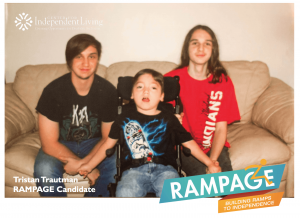 The youngest of three children, Tristan is verbal, he understands others; but is non-vocal. Born with cerebral palsy, he is prone to epileptic seizures and uses a wheelchair. Tristan’s mother Adriane, a single mother, does her best to provide for them. Since 2010 she has operated a cleaning service. She left an abusive marriage and she moved with her children into their current home in 2017. Unfortunately, the entrance to the home is not accessible for Tristan in his wheelchair.
The youngest of three children, Tristan is verbal, he understands others; but is non-vocal. Born with cerebral palsy, he is prone to epileptic seizures and uses a wheelchair. Tristan’s mother Adriane, a single mother, does her best to provide for them. Since 2010 she has operated a cleaning service. She left an abusive marriage and she moved with her children into their current home in 2017. Unfortunately, the entrance to the home is not accessible for Tristan in his wheelchair.
During the day, Tristan goes to Prescribed Pediatric Extended Care (PPEC). Tristan is very social and enjoys spending time with other children. However, there are steps at the entrance to their home which Tristan cannot navigate with his wheelchair making it extremely difficult to get him in and out. His mother shared their struggle. “The task of taking Tristan in and out is daunting and exhausting as he grows and gets bigger,” she said. “It used to take 5 minutes to get him in and out, but as he grows it takes longer and longer to walk down the steps with a 160-pound child and chair.” Adriane says that with a ramp, Tristan wouldn’t need someone to help take him in and out anymore. “We’d be able to go out more and go on walks like we used to.”
In October 2018, the Center for Independent Living partnered with Cuhaci & Peterson (C&P), Siemens, and First United Methodist Church Winter Park in building Tristan’s ramp. “They saw my immediate need and acted quickly,” Adriane said. “Within weeks, architectural drawings were completed, materials were purchased, and volunteers worked fiercely to make independence a reality for my son.” Now, Tristan and his mother can more easily maneuver in and out of his home, allowing both of them to live their lives a bit easier. “I can now take Tristan in and out of our home without fear,” Adriane said. “A gift…a real gift. CIL has provided an avenue for my family to make Tristan’s life a bunch easier. Truly freedom for him and for me.”

